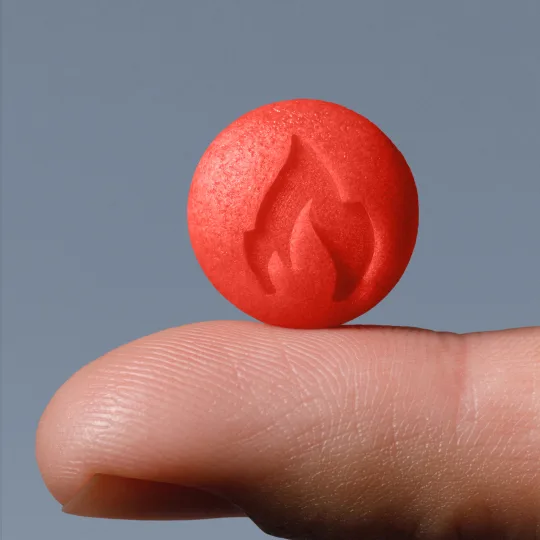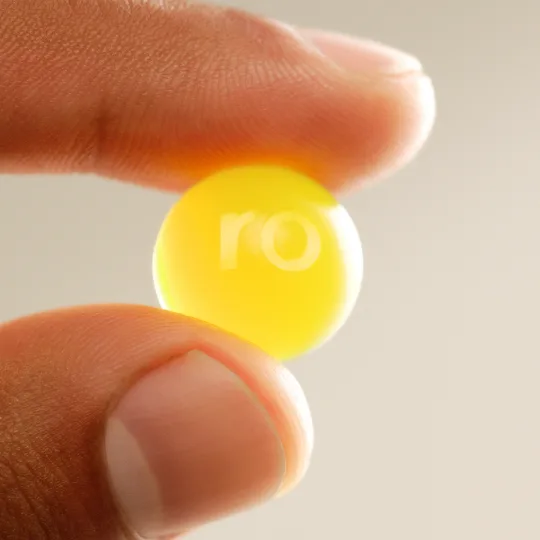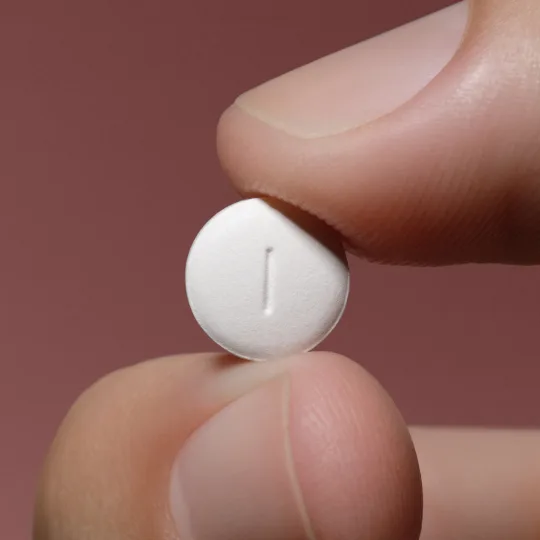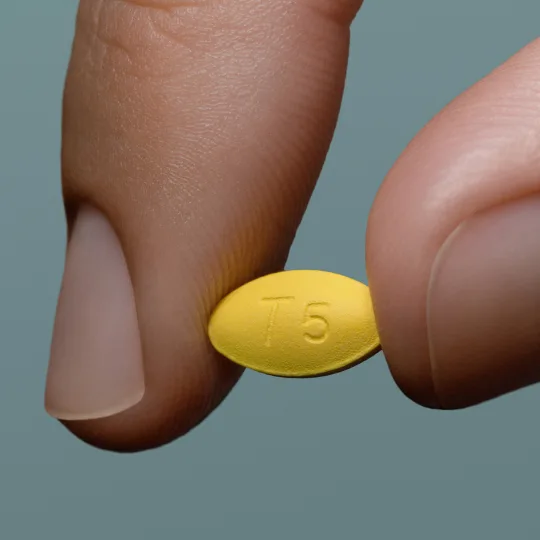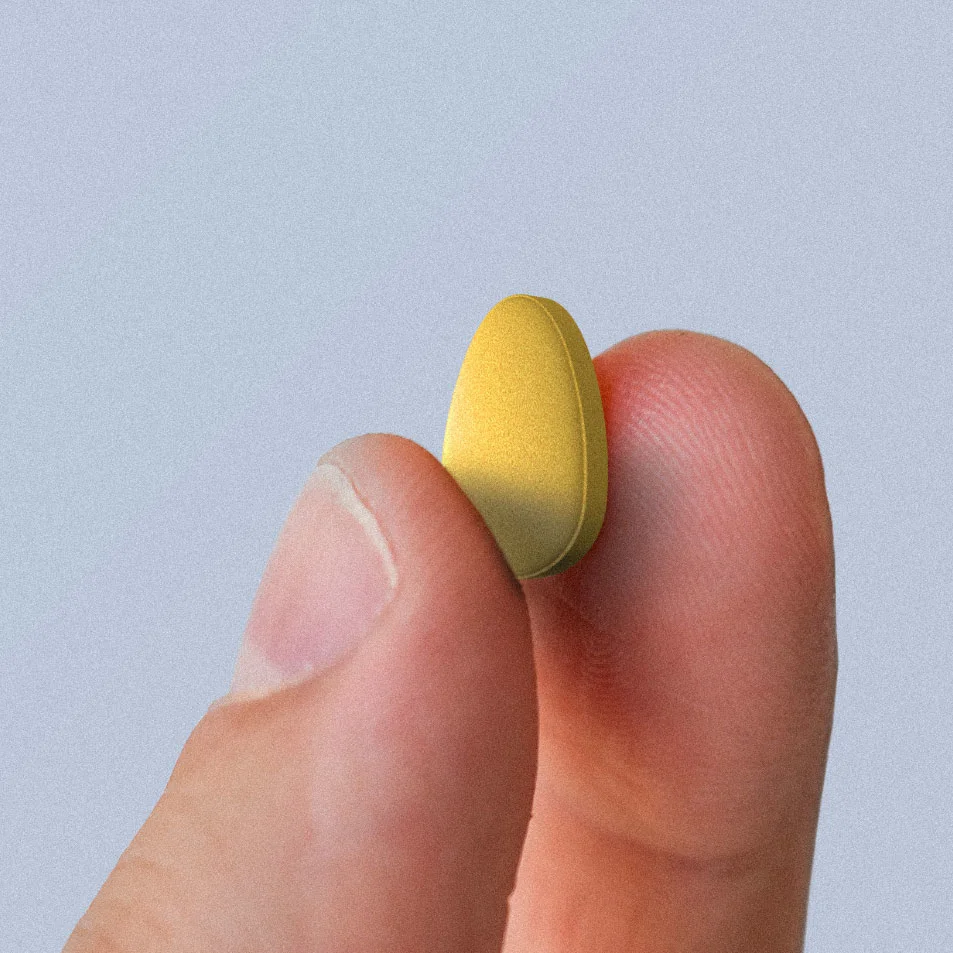Key takeaways
Cayenne pepper contains capsaicin, which may have various health benefits, such as improved blood flow and increased nitric oxide production.
The health benefits of capsaicin might also result in sexual health benefits, like improved erections, though research is limited.
It’s important to determine the underlying cause of your sexual dysfunction and seek medical treatment to address the root problem.
Here's what we'll cover
Here's what we'll cover
Here's what we'll cover
Key takeaways
Cayenne pepper contains capsaicin, which may have various health benefits, such as improved blood flow and increased nitric oxide production.
The health benefits of capsaicin might also result in sexual health benefits, like improved erections, though research is limited.
It’s important to determine the underlying cause of your sexual dysfunction and seek medical treatment to address the root problem.
Need help heating things up in the bedroom? Whether you’re struggling with erectile dysfunction (ED) or low libido, you might be curious about natural fixes, including foods that might help. One food that some praise for its purported sexy-time perks is cayenne pepper—but are there really benefits of cayenne pepper sexually?
Cayenne and other hot peppers contain capsaicin, which is the chemical that gives them their fiery kick. However, capsaicin can do more than just make peppers hot; it’s also responsible for various health benefits—some of which may, indirectly, impact down-there function and wellbeing. These include potentially boosting blood flow, improving overall erectile function, helping with weight management, and increasing testosterone levels.
Read on to learn about the potential sexual and general health benefits of cayenne pepper, as well as other ways to improve sexual function.
Benefits of cayenne pepper sexually
Cayenne pepper may not be as famous an aphrodisiac as oysters (or even cloves), but this spicy red pepper might be able to help your sex life. Anecdotally, some people report the sexual benefits of cayenne pepper, but we don’t have solid research that specifically examines the link between cayenne pepper and sexual functioning.
However, cayenne pepper and the capsaicin inside the veggie are linked to numerous health benefits that might benefit men’s sexual health as a result. Here are some potential benefits of cayenne pepper sexually.
May boost blood flow
Research suggests that cayenne pepper, particularly capsaicin, may improve blood flow and circulation throughout the body, including to the penis. A 2015 scientific review examined findings from both animal and human studies on capsaicin’s metabolic and vascular effects. While much of the evidence came from animal studies, the review did find that capsaicin relaxed blood vessels and, in turn, improved vasodilation (i.e. the widening of blood vessels) in rodents. By enhancing blood flow like such, the compound—and, in turn, cayenne pepper—could help you achieve better erections and might act as a natural aid for those who experience ED, a condition often caused by inhibited circulation to the penis. That being said, capsaicin’s effects are recognized for blood vessels in general, not necessarily in enhancing erections, so more research on humans, in particular, is needed.
May improve erectile function
Potentially boosting blood flow is only one of the ways capsaicin (and cayenne pepper) may lead to better erectile function. Research shows that the compound may also increase the production of nitric oxide, a gas naturally produced in the body that plays a major role in several bodily processes, including vasodilation. By activating an enzyme found in the muscle cells of blood vessels, nitric oxide signals the body to relax or widen blood vessels, which then lowers blood pressure and encourages blood flow. And as we covered above, adequate circulation is essential for getting and staying hard.
Another way cayenne pepper may improve erectile function is through its high content of antioxidants, most notably vitamin C and carotenoids. Antioxidants are disease-fighting powerhouses known to reduce oxidative stress, which is an imbalance of harmful molecules (free radicals) that’s linked to inflammation, cell damage, and other health issues, including ED, over time. While research on cayenne pepper’s antioxidants and ED is lacking, eating an antioxidant-rich diet—such as one that includes cayenne pepper—could prevent the development of ED. May help with weight management
Though there are many causes of ED, the number on the scale—aka your weight—can be one of them. Obesity, in particular, is a known contributor to ED. Studies show that people with obesity have up to three times higher risk of ED and that ED may be more severe in those with excess weight. But weight loss can help—just take it from research, which has found that losing weight can improve erections in those with overweight or obesity. And guess what can help with slimming down? Cayenne pepper and capsaicin.
Research suggests that cayenne pepper and capsaicin-containing chilies may help with weight loss and weight management in a few ways, including:
Activating brown adipose tissue (aka brown fat), a type of tissue that helps the body burn calories
Improving satiety (or the feeling of being full)
Reducing insulin resistance, which is closely linked to obesity
Of course, these effects may not be significant with small amounts of cayenne pepper and cayenne is unlikely to make a noticeable impact on its own. What’s more important is maintaining a healthy lifestyle and including nutritious foods with healthy properties as part of your balanced diet.
May increase testosterone levels
You may have also heard about a link between spicy foods and testosterone. Low testosterone is linked to low libido and, in some cases, ED. It’s possible that cayenne pepper may act on pathways related to testosterone production, so counteracting this might kick libido up a notch. However, these claims are based on older research conducted on mice, so more modern research on humans is needed.
Other health benefits of cayenne pepper
Cayenne pepper and capsaicin have other overall health benefits, too. However, it’s important to be realistic. Keep in mind that little sprinkles of ground cayenne on your dinner here and there likely won’t make a significant difference in your health. Cayenne is only one small piece of the puzzle when it comes to promoting overall wellbeing.
That said, here are a few stand-out health perks of cayenne pepper.
May boost immune function
In addition to vitamin C, cayenne pepper also contains lots of vitamin A. Just one 45-gram hot red chili pepper (such as cayenne pepper) contains 64.8 mg of vitamin C and 428 IU of vitamin A, which is about 72% and 8% of your daily recommended intakes respectively. All this is to say, the pepper is packed with two nutrients that are known to play star roles in supporting your immune system, so it stays strong and you stay healthy. Plus, the capsaicin in cayenne pepper may also help boost immune function. The compound can reduce inflammation, helping to combat chronic inflammation that can otherwise weaken the immune system and, in turn, increase the risk of certain chronic illnesses.
May improve heart health
As mentioned above, capsaicin (and, thus, cayenne pepper) may be able to improve blood flow by promoting vasodilation. This relaxation and widening of blood vessels can, in turn, help lower blood pressure by reducing resistance to blood flow. And research (at least on rodents) backs this up: In a study of hypertensive rats, capsaicin administered through pumps for 28 days improved both hypertension (high blood pressure) and heart health in the animals. But research on humans is needed to truly determine the pepper’s effects on blood pressure. Furthermore, these rats received a continuous infusion of capsaicin for 28 days. Human beings are unlikely to consume such high amounts, which means it might be very challenging to replicate the effects of this study.
Another study (this time in humans) found that people who regularly consume chili peppers may have reduced chances of death, partially due to a lower risk of heart disease and stroke. Of course, such a claim would need to be proven by additional studies and further data, and research at this time is limited on the subject.
May help gut health
Prebiotics, a type of fiber that serves as food for probiotics, help support gut health and healthy digestion. Probiotics, aka “good” bacteria in your gut, help maintain a balanced gut microbiome. Prebiotics promote the healthy growth and activity of probiotics which can result in a better gut environment. Some research suggests that certain compounds in cayenne pepper, including capsaicin, may have prebiotic-like effects by supporting probiotic activity and contributing to an overall healthy gut microbiome. However, more research is needed to fully understand the substance’s role in gut health.
Are there any health risks of cayenne pepper?
Eating cayenne pepper is generally safe, but there are a few risks to be aware of. For example, cayenne pepper can cause gastrointestinal upset in those with sensitive stomachs. If your stomach typically doesn’t respond well to spicy foods, then you might want to steer clear of cayenne pepper. Similarly, those with acid reflux might want to avoid the substance, as it can worsen GERD symptoms.
Eating cayenne peppers in excess or taking capsaicin supplements may cause drug interactions. Capsaicin can increase the risk of bleeding if you take blood thinners like aspirin, Plavix, or Coumadin. It may also lower your blood sugar, so if you have diabetes, this can put you at risk of hypoglycemia. Sprinkles of cayenne should be fine, but when in doubt, contact your healthcare to make sure cayenne peppers (and/or capsaicin supplements) are safe for you.
Alternatives to cayenne pepper for sexual health and function
Although cayenne peppers could deliver some down-there perks, there are plenty of treatments out there that are far more well-studied and actually proven to promote positive sexual function and wellbeing.
That’s not to say you shouldn’t incorporate cayenne pepper into your diet. After all, the foods you eat can play a significant role in sexual health—plus, eating nutritiously is linked to a lower risk of ED over time. But, even if you get the green light from your healthcare provider, chowing down on cayenne pepper after cayenne pepper every day isn’t going to treat any ED or other sexual dysfunction in and of itself.
What might, however, are prescription medications, such as Viagra (sildenafil) and Cialis (tadalafil). Approved by the US Food and Drug Administration (FDA) to treat ED, these drugs are known as PDE5 inhibitors, which work in part by relaxing blood vessels and increasing blood flow to the penis when you are aroused. In addition to the aforementioned pills, other PDE5 inhibitors—all of which require a prescription from a licensed healthcare provider—include vardenafil and Stendra (avanafil).
Certain PDE5 inhibitors can also be found in different (non-pill) formulations. Take, for example, Ro Sparks, which is a sublingual (under-the-tongue) treatment that contains both sildenafil and tadalafil (the active ingredients in Viagra and Cialis, respectively). Then there are Ro’s Daily Rise Gummies, which are once-daily, fruit-flavored gummies that are made with tadalafil.
Though they’re often considered first-line treatment for ED, PDE5 inhibitors aren’t a fit for everyone. If they don’t work for you, your healthcare provider might bring up other treatment options, such as injections or a penis pump (a non-surgical device that boosts blood flow to the penis). Some of these methods do not rely on arousal to achieve an erection, making them a more convenient option for some individuals.
And need not forget about lifestyle modifications. In addition to eating a balanced, nutritious diet, regularly exercising, getting ample shut-eye, and reducing stress can all help treat (or even prevent) ED.
All that said, the best treatment for ED depends on the underlying cause, whether that’s cardiovascular problems or even mental health struggles. That’s why it’s so important to consult a healthcare provider if you’re experiencing symptoms of ED or general sexual dysfunction. They can help determine what might be to blame for your down-there difficulties and help develop an appropriate treatment plan.
Have better sex with Ro
Bottom line: benefits of cayenne pepper sexually
While cayenne pepper has some health perks that may, in turn, lead to sexual benefits, these effects are unlikely to make a significant difference in your sexual function and wellbeing, especially if you struggle with ED or low libido. The hard truth is cayenne peppers aren’t guaranteed to help you get hard or boost arousal.
Ultimately, there’s a lack of research. Scientists haven’t conducted human studies that directly examine the benefits of cayenne pepper sexually. The claims are theoretical and based on studies examining the general benefits of capsaicin in animals and humans. Plus, we don’t know the exact dosage of cayenne pepper or capsaicin to result in said sexual benefits.
Cayenne pepper is not a cure for sexual dysfunction. This spicy food may result in some health benefits, but it is not a cure for low libido, erectile dysfunction, or other sexual health struggles.
You may want to opt for more legitimate treatments. Clinically proven treatments, such as Viagra or Cialis, are far more reliable and likely to result in desired effects than cayenne pepper or capsaicin supplements.
Make sure you determine the underlying cause. There are many possible underlying causes for sexual dysfunction, including both physical and mental health conditions. Determining and treating the underlying cause can make a big difference in your sex life and overall well-being.
Frequently asked questions (FAQs)
Will cayenne pepper help with erectile dysfunction?
Cayenne pepper is not a cure for erectile dysfunction. However, the capsaicin found in cayenne peppers could have some health benefits, like improved blood flow and nitric oxide production, which may, in turn, help sexual function. But evidence of these effects is lacking and more research on humans is needed.
Is cayenne pepper good before bed?
Generally speaking, spicy foods aren’t ideal to eat before bed. That’s because these types of eats are more likely to give you heartburn or indigestion—both of which can make it harder for you to score shut-eye.
How much cayenne pepper should you have per day?
There are no clinical guidelines suggesting how much cayenne pepper you should consume daily if you want to reap the health benefits. As with anything else, it’s always a good idea to consult a healthcare provider (or, in this case, a dietitian); they’re best equipped to determine whether daily cayenne pepper consumption is safe for you and if so, how much you should consume based on individual factors, such as your medical history, current health status, and more. Keep in mind that ultimately, it’s best to focus on an all-around balanced healthy diet rather than how much of one food you should consume. Cayenne has risks for your GI system, too, so if you are suffering from acid reflux or ulcers, consult your healthcare providers to see if adding cayenne to your diet is safe.
DISCLAIMER
If you have any medical questions or concerns, please talk to your healthcare provider. The articles on Health Guide are underpinned by peer-reviewed research and information drawn from medical societies and governmental agencies. However, they are not a substitute for professional medical advice, diagnosis, or treatment.
Viagra Important Safety Information: Read more about serious warnings and safety info.
Cialis Important Safety Information: Read more about serious warnings and safety info.
References
Azlan, A., Sultana, S., Huei, C. S., et al.(2022). Antioxidant, Anti-Obesity, Nutritional and Other Beneficial Effects of Different Chili Pepper: A Review. Molecules (Basel, Switzerland), 27(3), 898. doi: 10.3390/molecules27030898. Retrieved from https://pmc.ncbi.nlm.nih.gov/articles/PMC8839052/
Chopan, M. & Littenberg, B. (2017). The Association of Hot Red Chili Pepper Consumption and Mortality: A Large Population-Based Cohort Study. PloS One, 12(1), e0169876. doi: 10.1371/journal.pone.0169876. Retrieved from https://pmc.ncbi.nlm.nih.gov/articles/PMC5222470/
Elmas, C. & Gezer, C. (2022). Capsaicin and Its Effects on Body Weight. Journal of the American Nutrition Association, 41(8), 831–839. doi: 10.1080/07315724.2021.1962771. Retrieved from https://pubmed.ncbi.nlm.nih.gov/34383610/
Ilhan, T. & Erdost, H. (2012). Effects of capsaicin on testis ghrelin expression in mice. Biotechnic & Histochemistry, 88(1), 10–18. doi: 10.3109/10520295.2012.724083. Retrieved from https://pubmed.ncbi.nlm.nih.gov/23013364/
Jia, X. Y., Jiang, D. L., Jia, X., et al. (2023). Capsaicin improves hypertension and cardiac hypertrophy via SIRT1/NF-κB/MAPKs pathway in the hypothalamic paraventricular nucleus. Phytomedicine : International Journal of Phytotherapy and Phytopharmacology, 118, 154951. doi: 10.1016/j.phymed.2023.154951. Retrieved from https://pubmed.ncbi.nlm.nih.gov/37453193/
Kantar, M. B., Anderson, J. E., Lucht, S. A., et al. (2016). Vitamin Variation in Capsicum Spp. Provides Opportunities to Improve Nutritional Value of Human Diets. PloS One, 11(8), e0161464. doi: 10.1371/journal.pone.0161464. Retrieved from https://pmc.ncbi.nlm.nih.gov/articles/PMC4988645/
Leslie, S. W. & Sooriyamoorthy, T. (2024). Erectile Dysfunction. StatPearls. Retrieved on Feb. 10 2025, from https://www.ncbi.nlm.nih.gov/books/NBK562253/
Li, H., Xu, W., Wang, T., et al. (2022). Effect of weight loss on erectile function in men with overweight or obesity: A meta-analysis of randomised controlled trials. Andrologia, 54(1), e14250. doi: 10.1111/and.14250. Retrieved from https://onlinelibrary.wiley.com/doi/epdf/10.1111/and.14250
Lu, Y., Kang, J., Li, Z., et al (2021). The association between plant-based diet and erectile dysfunction in Chinese men. Basic and Clinical Andrology, 31(1). https://doi.org/10.1186/s12610-021-00129-5. Retrieved from https://bacandrology.biomedcentral.com/articles/10.1186/s12610-021-00129-5#citeas
McCarty, M. F., DiNicolantonio, J. J., & O'Keefe, J. H. (2015). Capsaicin may have important potential for promoting vascular and metabolic health. Open Heart, 2(1), e000262. doi: 10.1136/openhrt-2015-000262. Retrieved from https://pubmed.ncbi.nlm.nih.gov/26113985/
MedlinePlus. (2023). Capsicum. Retrieved from https://medlineplus.gov/druginfo/natural/945.html
Moon, K. H., Park, S. Y., & Kim, Y. W. (2019). Obesity and Erectile Dysfunction: From Bench to Clinical Implication. The World Journal of Men's Health, 37(2), 138–147. doi: 10.5534/wjmh.180026. Retrieved from https://pmc.ncbi.nlm.nih.gov/articles/PMC6479091/
Nisar, M., Mohammad, R. M., Arshad, A., et al. (2019). Influence of Dietary Intake on Sleeping Patterns of Medical Students. Cureus, 11(2), e4106. doi: 10.7759/cureus.4106. Retrieved from https://pmc.ncbi.nlm.nih.gov/articles/PMC6476615/
Panchal, S. K., Bliss, E., & Brown, L. (2018). Capsaicin in Metabolic Syndrome. Nutrients, 10(5), 630. doi: 10.3390/nu10050630. Retrieved from https://pmc.ncbi.nlm.nih.gov/articles/PMC5986509/
Patcharatrakul, T., Kriengkirakul, C., Chaiwatanarat, T., et al. (2020). Acute Effects of Red Chili, a Natural Capsaicin Receptor Agonist, on Gastric Accommodation and Upper Gastrointestinal Symptoms in Healthy Volunteers and Gastroesophageal Reflux Disease Patients. Nutrients, 12(12), 3740. https://doi.org/10.3390/nu12123740. Retrieved from https://www.mdpi.com/2072-6643/12/12/3740
Thongin, S., Den-Udom, T., Uppakara, K., et al. (2022). Beneficial effects of capsaicin and dihydrocapsaicin on endothelial inflammation, nitric oxide production and antioxidant activity. Biomedicine & Pharmacotherapy, 154, 113521. https://doi.org/10.1016/j.biopha.2022.113521. Retrieved from https://www.sciencedirect.com/science/article/pii/S0753332222009106
Zheng, J., Zheng, S., Feng, Q., et al. (2017). Dietary capsaicin and its anti-obesity potency: from mechanism to clinical implications. Bioscience Reports, 37(3), BSR20170286. doi: 10.1042/BSR20170286. Retrieved from https://pmc.ncbi.nlm.nih.gov/articles/PMC5426284/
Zhu, H., Chen, S., Ye, Q. et al. (2024). Association between composite dietary antioxidant index and erectile dysfunction among American adults: a cross-sectional study. Science Reports, 14, 21230. Retrieved from https://www.nature.com/articles/s41598-024-72157-w



